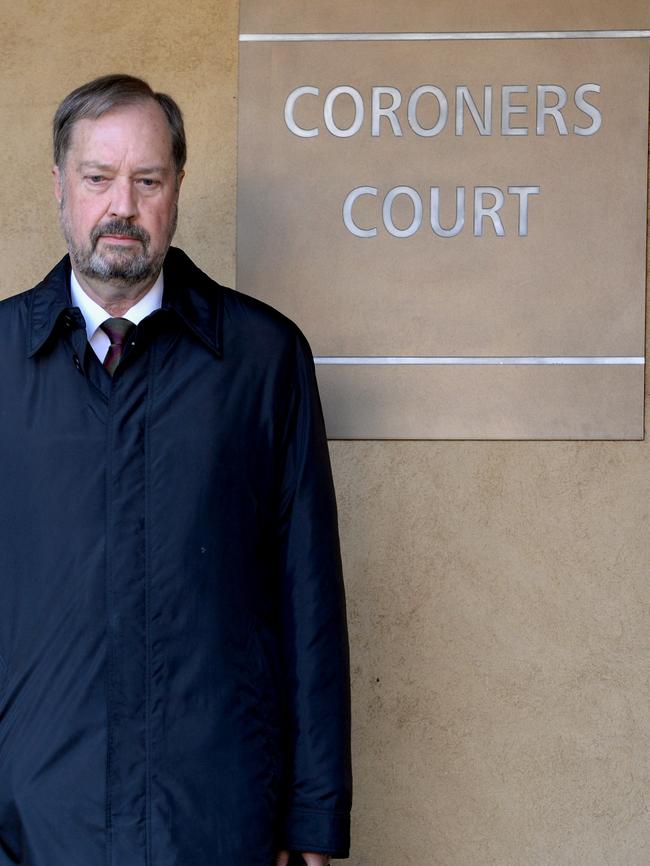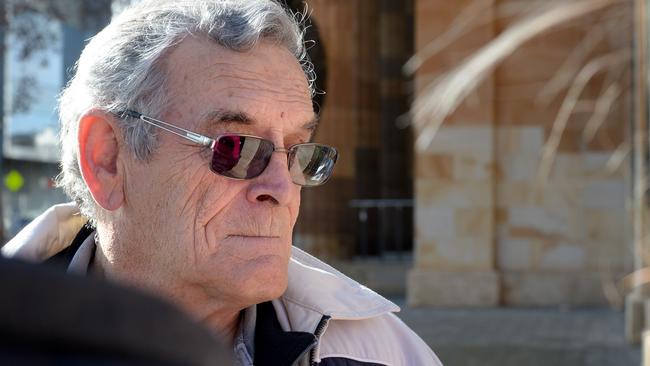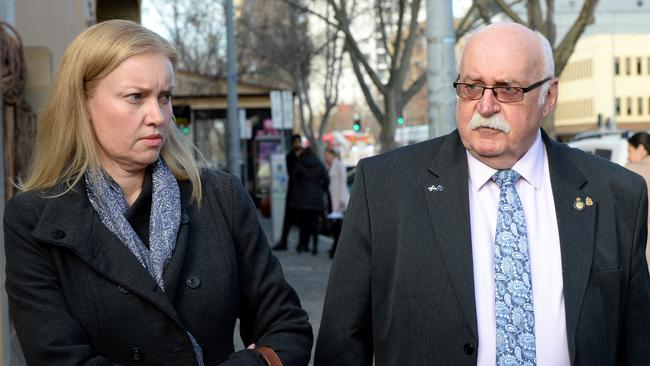SA Coroner told two of the RAH chemo bungle victims were told they had been underdosed before their deaths
UPDATE: Claims one of the RAH chemotherapy bungle victims died without knowing she had been underdosed have been withdrawn and corrected, based on evidence in her medical records.
SA News
Don't miss out on the headlines from SA News. Followed categories will be added to My News.
- Four victims of State Government failures and bungles speak out
- How a ‘typo’ led to underdosing of chemo patients
- Andrew Knox: It’s not about compo for victims, it’s about cover-ups
- Chemo underdosing ‘could have been avoided by SA Health’
- Cancer patient relapsed after second major RAH treatment error
CLAIMS an RAH chemotherapy bungle victims died without knowing she had been underdosed have been withdrawn, just hours after the State Government denied them in Parliament.
On Thursday, Deputy State Coroner Anthony Schapel opened an inquest into the deaths of Christopher McRae, 67, last November and Johanna Pinxteren, 76, in June last year.
Naomi Kereru, counsel assisting the Coroner, told the inquest there was no evidence to suggest Mrs Pinxteren had been told of the bungle prior to her death.
That subsequently prompted a denial, during Question Time, by Health Minister Jack Snelling who said it was “documented unequivocally” that Mrs Pinxteren had been informed.
At 4pm, the inquest was called back into court and Ms Kereru said she wanted to correct the record.
She said Mrs Pinxteren’s records for March 11, 2015, showed Dr Devenda Hiwase had discussed both her case and the bungle.
“(The notes) say ‘informed about issue of underdosing ... due to clerical error, but explained that in her case it did not matter much’,” Ms Kereru said.
“(It goes on to say) ‘have apologised to the patient for mistake’.”
Counsel for Ms Snelling and the doctors thanked Ms Kereru for the correction, saying the doctors felt “aggrieved and distressed” by media coverage of the earlier claims.
The inquest also heard:
ADMISSIONS by State Government lawyers that Mr McRae and Mrs Pinxteren were among 10 patients given half the recommended dose of the chemotherapy drug Cytarabine.
SA HEALTH told Mr McRae the bungle was “being taken very seriously by the Department” and “being investigated very thoroughly”.
A DOCTOR told Mr McRae he was “unsure” if the mistake had contributed to the relapse that would eventually kill him “but of course there was the possibility”.
CLAIMS both deaths should have, under state law, been reported to the Coroner but neither was — with Mrs Pinxteren’s death coming to his attention just two weeks ago.
CENTRAL to the inquest is whether underdosing affected the pair’s chances of survival, and whether “systemic failure” in the hospital contributed to their deaths.

Mr McRae and Mrs Pinxteren’s dosing error was the result of a “typo” in a protocol for treatment relied on by the Royal Adelaide Hospital and the Flinders Medical Centre.
Its discovery triggered an inquiry that uncovered significant problems in governance, particularly at the RAH, and a failure to disclose the error once it was discovered.
Opening the inquest, Ms Kereru said the underdosing of patients was discovered in January 2015.
She said her office became aware of Mr McRae’s death “some months after” it occurred.
“We only became aware of Mrs Pinxteren’s death two weeks ago ... (state) law applies not only to deaths that are reportable, but that may be reportable,” she said.
“These deaths were notifiable by virtue of them being unnatural or unusual (due to) the alleged misadventure in the course of their treatment.
“There is evidence to suggest there was a commonality of the identities of the clinicians treating both Mrs Pinxteren and Mr McRae.”
Ms Kereru said doctors who could potentially be called as witnesses included Anya Hotinski, Devenda Hiwase and Ashanka Beligaswatte.
She said that, in March 2015, Mr McRae and his family were told he had suffered “a probable relapse” of his cancer.
“Another issue raised, as recorded in the case notes, was a recently discovered dosing error,” she said.
“This related to a dose which was half the recommended dose of Cytarabine in two (treatments) he had received.
“(The notes say) this underdosing had occurred due to a protocol error which was being taken very seriously by the Department and was being investigated thoroughly at the time.
“They say, and I quote, Dr Hotinski was ‘unsure if this contributed to the relapse but, of course, there was the possibility’.”

She said Mr Schapel would have to determine several key issues through his findings.
“The central issues are whether the underdosing of these two patients had any effect on their chances of survival,” she said.
“In addition, whether any systemic failure within hospital systems contributed to any error in their treatment.
Todd Golding, for Mr Snelling, said he “could confirm” Mrs Pinxteren and Mr McRae were “part of the group of 10” patients affected.
He said SA Health had not confirmed that fact “previously and publicly” due to “privacy laws”, but an exception “had now been granted”.
Mr Golding insisted it was too soon to assert the deaths should have been reported to the Coroner.
“That is a live issue, an open question, and it’s premature to be saying that in advance of the evidence or to infer there has been an error in them not being reported,” he said.
He acknowledged several summons from Ms Kereru seeking all documentation and correspondence regarding Mrs Pinxteren and her family.
Although it had been “drafted in a way that is invalid”, he assured the court the search for the materials “was nevertheless underway”.
All parties agreed it was too early in the investigation to set a date for oral evidence, saying witness and document lists were still to be prepared.
Mr Schapel adjourned the inquest to a further directions hearing next month.
Outside court, Mrs Pinxteren’s cousin, Jack Bosman, said his family was “shocked” and “wanted answers” from the inquest.
Mr McRae’s family and supporters attended court but declined to comment.
Fellow bungle victim Andrew Knox said the revelations were “gobsmacking”, “unconscionable” and “just extraordinary”.
“If there was ever a reason for the Health Minister (Jack Snelling) to stand down, and for a judicial inquiry to be called, this is it,” he said.
He said the matter was “still very raw” to the McRae family.
“They have been in a terrible situation and all of our hearts go out to them ... they have to bear the months of this to come as well, to relive it all again,” he said.
“We are victims of the grossest deception, and both the public and ourselves have been put at risk, but I doubt anything will put pressure on our Premier to do anything.”

Mr Knox said the scandal was further affecting the health of all the surviving patients who were underdosed.
“It’s pretty tough ... the stress is taking it’s toll, I’m getting very tired,” he said.
“One way it could be relieved is for the Premier to do the proper thing ... then I could concentrate on trying to survive.”
The inquest prompted fiery scenes in Question Time on Thursday afternoon, as Opposition Leader Steven Marshall pressed Mr Snelling on the matter.
“Why did the minister tell the public, in August 2015, that none of the 10 victims of the chemotherapy dosing errors had died, when Johanna Pinxteren was already dead?” he asked.
Mr Snelling said he was “not going to add any more” to what he had said previously, adding Mr Marshall “knows full well why I won’t engage him on this with regard”.
Mr Marshall said that was not the case.
“We’ve got no idea, tell us why ... you keep saying we know exactly why, tell us why,” he said, earning the first of two warnings from Speaker Michael Atkinson.
“I’d be very quiet about this issue ... I will not engage in the details of this particular patient, and the Opposition fully know well why I won’t,” Mr Snelling replied.
Mr Marshall asked if the “failure” to inform Mrs Pinxteren of the underdosing was “the cover-up that the Premier has previously referred to?”.
“I completely reject and unequivocally refute that assertion,” Mr Snelling said.
Asked why he claimed no one had died, he said he did not “normally get informed about individual patients or their patient records or what’s going on with individual patients”.
He said he “was not going to give a running commentary” on the inquest but was prepared to “make an exception” with regard to whether Mrs Pinxteren had been informed of the bungle.
“The answer is yes,” he said.
“I am not at liberty to go into how I know, but I can say that it is documented unequivocally that this patient was informed of the underdosing.”
Deputy Opposition Leader Vickie Chapman asked Attorney-General John Rau if SA Health had sought advice over the legal requirement to inform the Coroner of reportable deaths.
She asked whether SA Health had sought counsel “as to whether they have broken the law in failing to disclose the death of Johanna Pinxteren”.
“I am not aware as to whether the summary of the alleged facts is correct, nor whether, if indeed it is correct, it was based in any way on fact that such a request has been made of the crown,” Mr Rau replied.
“But I can inquire.”


